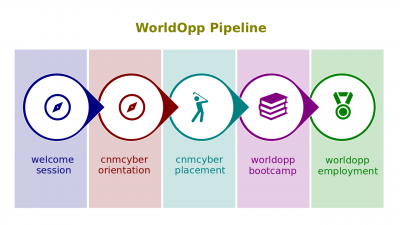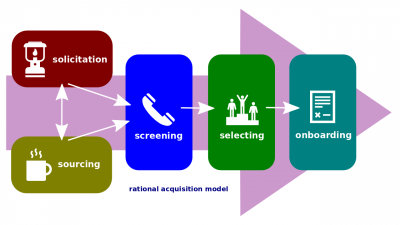Difference between revisions of "Book of Recruitment"
(→Job Market Essentials) |
(→Job Market Essentials) |
||
| Line 29: | Line 29: | ||
===Job Market Essentials=== | ===Job Market Essentials=== | ||
:''Main wikipage: [[Job Market Essentials]]'' | :''Main wikipage: [[Job Market Essentials]]'' | ||
| − | :'''[[Job market]]'''. Some [[market]] in which, on the one hand, [[employer]]s would like to exchange their [[employee compensation]]s to one's willingness to perform employer's jobs and, on the other hand, [[employment candidate]]s would like to exchange their willingness to perform employer's jobs to employer's compensation. | + | :'''[[Job market]]'''. Some [[market]] in which, on the one hand, [[employer]]s would like to exchange their [[employee compensation]]s to one's willingness to perform employer's jobs and, on the other hand, [[employment candidate]]s would like to exchange their willingness to perform employer's jobs to employer's compensation.<div style="background-color:#efefef; padding: 5px; margin: 15px;"> |
:*'''[[Human capital]]'''. | :*'''[[Human capital]]'''. | ||
:*'''[[Unemployment]]'''. | :*'''[[Unemployment]]'''. | ||
| − | :*'''[[Unemployment rate]]'''. | + | :*'''[[Unemployment rate]]'''.</div> |
| − | :'''[[Employer]]'''. Any [[legal entity]] that employs one or more [[employee]]s. | + | :'''[[Employer]]'''. Any [[legal entity]] that employs one or more [[employee]]s.<div style="background-color:#efefef; padding: 5px; margin: 15px;"> |
:*'''[[Government organization]]'''. | :*'''[[Government organization]]'''. | ||
:*'''[[Non-profit corporation]]'''. | :*'''[[Non-profit corporation]]'''. | ||
:*'''[[Startup business]]''' (or, simply, [[startup]]). (1) A [[business]] in its search of its [[business model]], which usually means ways not to depend on external [[funding]]; (2) An [[enterprise]] in the early stages of operations. [[Startup]]s are usually seeking to solve a [[problem]] of fill a need, but there is no hard-and-fast rule for what makes a [[startup]] since situations differ. Often, a company is considered a [[startup]] until they stop referring to themselves as a [[startup]]. | :*'''[[Startup business]]''' (or, simply, [[startup]]). (1) A [[business]] in its search of its [[business model]], which usually means ways not to depend on external [[funding]]; (2) An [[enterprise]] in the early stages of operations. [[Startup]]s are usually seeking to solve a [[problem]] of fill a need, but there is no hard-and-fast rule for what makes a [[startup]] since situations differ. Often, a company is considered a [[startup]] until they stop referring to themselves as a [[startup]]. | ||
| − | :*'''[[Operational business]]'''. Any [[business]], which [[business model]] generates revenue. | + | :*'''[[Operational business]]'''. Any [[business]], which [[business model]] generates revenue.</div> |
| − | :'''[[Job-market intermediary]]'''. | + | :'''[[Job-market intermediary]]'''.<div style="background-color:#efefef; padding: 5px; margin: 15px;"> |
| − | :*'''[[Labor union]]'''. An association of employees that forms a [[bargaining unit]] in order to negotiate, execute, and/or manage a [[collective bargaining agreement]]. | + | :*'''[[Labor union]]'''. An association of employees that forms a [[bargaining unit]] in order to negotiate, execute, and/or manage a [[collective bargaining agreement]].</div> |
===Search for Job Candidates=== | ===Search for Job Candidates=== | ||
Revision as of 23:05, 19 October 2019
Introduction to Recruitment (hereinafter, the Session) is a learning session introducing its participants to recruitment and related topics. The Session consists of five presentations, each of which is followed by a quiz. The official version of the Session is published at CNM Certs. Its materials are also published at CNM Pages, CNM Wikis, and various channels for marketing and convenience purposes.
The Session is the third of eight sessions of both CNM Digital Orientation and WorldOpp Orientation.
Contents
Outline
Introduction to Employment is the predecessor session.
Recruitment Essentials
- Main wikipage: Recruitment Essentials; video (4:44)
- Recruitment. The process of filling job vacancies with people.
- Source selection. The process of selecting sources whose resources, credibility, and performance is expected to meet the contract and/or procurement objectives within a competitive range of cost.
- Onboarding. The mechanism of integrating a new employee into the enterprise and its culture.
Recruitment Needs
- Main wikipage: Recruitment Needs; video (4:17)
- Recruitment need.
- Job analysis. An assessment that defines jobs and the behaviors necessary to perform them.
- Job description. A written statement that describes a job.
- Credential creep. The process of inflation of the minimum credentials required for a given job and the simultaneous devaluation of the value of diplomas and degrees.
- KSA (or knowledge, skills, and abilities). Description of work-related competence in a series of narrative statements. KSAs are particularly required when applying to United States Federal Government job openings. KSAs are used to determine, along with résumés, who the best applicants are when several candidates qualify for a job.
- Work-related knowledge. A body of knowledge applied directly to a particular occupation and/or industry.
- Work-related skill. A set of skills applied directly to a particular occupation and/or industry.
- Work-related ability. A set of capacities applied directly to a particular occupation and/or industry.
Job Market Essentials
- Main wikipage: Job Market Essentials
- Job market. Some market in which, on the one hand, employers would like to exchange their employee compensations to one's willingness to perform employer's jobs and, on the other hand, employment candidates would like to exchange their willingness to perform employer's jobs to employer's compensation.
- Employer. Any legal entity that employs one or more employees.
- Government organization.
- Non-profit corporation.
- Startup business (or, simply, startup). (1) A business in its search of its business model, which usually means ways not to depend on external funding; (2) An enterprise in the early stages of operations. Startups are usually seeking to solve a problem of fill a need, but there is no hard-and-fast rule for what makes a startup since situations differ. Often, a company is considered a startup until they stop referring to themselves as a startup.
- Operational business. Any business, which business model generates revenue.
- Job-market intermediary.
- Labor union. An association of employees that forms a bargaining unit in order to negotiate, execute, and/or manage a collective bargaining agreement.
Search for Job Candidates
- Main wikipage: Search for Job Candidates; video (2:44)
- Sourcing. Enterprise efforts undertaken in order to identify and list possible sources, internal and/or external, that are potentially capable to provide the specified organizational resources, as well as potential data sources who are able to provide relevant information on specific acquisitions.
- ERP human resources. Any system for human resource management that is integrated into a larger enterprise management system. Usually, both systems are built on enterprise resource planning software.
- In-network message. A message sent to the members of a network.
- Employment resource. Any resource, usually web-based, that allows for matching employers and employment candidates.
Screening of Job Candidates
- Main wikipage: Screening of Job Candidates; video (5:02)
- Source screening. (1) The evaluation or investigation of a source as part of a methodical survey, to assess suitability for a particular role or purpose; (2) Techniques used for source consideration, reviewing, analyzing, ranking, and selecting the best alternatives for the proposed action.
- Job interview (more narrowly, employment interview). An interview consisting of a conversation between a job applicant and one or more representatives of an employer which is conducted to (a) assess whether the applicant may be hired and, possibly, (b) negotiate conditions of this hiring.
- Situational judgment test. A substantive selection test that asks applicants how they would perform in a variety of job situations; the answers are then compared to the answers of high-performing employees.
- Work sample test. A hands-on simulation of part or all of the work that applicants for routine jobs must perform.
- Assessment center. An off-site place where candidates are given a set of performance simulation tests designed to evaluate their managerial potential.
Recruiters' Essentials
- Main wikipage: Recruiters' Essentials; video (6:10)
- Recruitment service. Any service related to recruitment.
- Recruiter. A legal entity whose business is to enlist or enroll people as employees, students, or as members of an organization.
- Retained recruiter. A recruiter who is paid for the time spent while recruiting regardless of the fact whether qualified sources are identified, hired, or not.
- Contingency recruiter. A recruiter who is paid only when qualified sources are identified and hired.
- Hiring manager. A representative of the employer responsible for hiring one or more employees to fill open positions. That manager may work for that employer as an employee, be hired as an independent contractor, or be an employee of another recruiter.
- Outsourced recruitment. The whole recruitment or its part that is outsourced to another legal entity, either an individual or an organization.
- Employment agency. Any entity that matches employers and employment candidates.
- Staffing firm. Any entity that provides employers with their staffers.
- Temporary staffing provider. Any entity that provides employers with temporary staffers.
- Headhunter (executive search provider or headhunting provider). A specialized recruitment service designed to provide employers with highly qualified employment candidates especially for senior-level and executive jobs.
- Recruitment fee. The fee that an employer agrees to pay as a compensation for sourcing, screening, and, sometimes, selecting one or more employment candidates.
- Placement fee. The fee that an employer agrees to pay a contingency recruiter as a compensation for placing one or more employment candidates into specified employment. In the United States, those fees are typically collected as a percentage of the annual salary of the hired, ranging between 20% to 33%.
- Referral fee (finder's fee). A commission paid to an intermediary or the facilitator of a business transaction. This fee is rewarded because the intermediary discovered the deal and brought it forth to interested parties. Depending on the circumstance, this fee can be paid by either the transaction's buyer or seller. In the United States, either an employer or a recruiter may pay the fee for finding a right employment candidate. For instance, an employer may pay the fee to its current employee instead of paying the placement fee to a contingency recruiter. Or a contingency recruiter may pay the fee from its placement fee, etc.
Introduction to Careers is the successor session.
Preview presentations
Video
- The video preview presentation, 1:43 minutes, is published at https://youtu.be/Emr8exlqUfc. Here is its full text:
Introduction to Recruitment Preview. In the previous session which was introduction to employment, we discussed that employment consist of two parts. Employees and employers. Employees give their time and employers pay them money but the people who bring together employees and employment candidates and employers are recruiters, recruiters play a significant part in this process.
In this session we are going to review the recruitment process, we will go over rational acquisition model, we will discuss selection and how selection goes, like the selection process, we will review onboarding which brings new employees to the company, we will discuss statement of recruitment needs, we will talk about KSA`s which are knowledge skills and abilities, we will discuss funding potential candidates screening of those candidates and we will end with the services of recruiters including house hold recruitment and recruitment fees.
Hopefully we will be ready to jump to carrier administration as the successor lecture.




